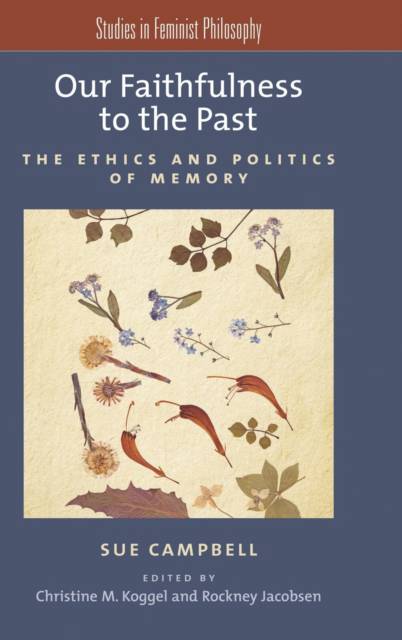
- Retrait gratuit dans votre magasin Club
- 7.000.000 titres dans notre catalogue
- Payer en toute sécurité
- Toujours un magasin près de chez vous
- Retrait gratuit dans votre magasin Club
- 7.000.0000 titres dans notre catalogue
- Payer en toute sécurité
- Toujours un magasin près de chez vous
Description
This volume brings together essays -- three of them previously unpublished -- on the epistemology, ethics, and politics of memory by the late feminist philosopher Sue Campbell. The essays in Part I diagnose contemporary skepticism about personal memory, and develop an account of good remembering that is better suited to contemporary (reconstructive) theories of memory. Campbell argues that being faithful to the past requires both accuracy and integrity, and is both an epistemic and an ethical achievement. The essays in Part II focus on the activities and practices through which we explore and negotiate the shared significance of our different recollections of the past, and the importance of sharing memory for constituting our identities. Views about self, identity, relation, and responsibility (all influenced by traditions in feminist philosophy) are examined through the lens of Campbell's relational conception of memory. She argues that remaining faithful to our past sometimes
requires us to re-negotiate the boundaries between ourselves and the collectives to which we belong. In Part III, Campbell uses her relational theory of memory to address the challenges of sharing memory and renewing selves in contexts that are fractured by moral and political difference, especially those arising from a history of injustice and oppression. She engages in detail Canada's Indian Residential Schools Truth and Reconciliation Commission, where survivor memories have the potential to illuminate the significance of the past for a shared future. The study of memory brings together philosophers, psychologists, historians, anthropologists, legal theorists, and political theorists and activists. Sue Campbell demonstrates a singular ability to put these many different areas of scholarship and activism into fruitful conversation with each other while also adding an original and powerful voice to the discussion.
requires us to re-negotiate the boundaries between ourselves and the collectives to which we belong. In Part III, Campbell uses her relational theory of memory to address the challenges of sharing memory and renewing selves in contexts that are fractured by moral and political difference, especially those arising from a history of injustice and oppression. She engages in detail Canada's Indian Residential Schools Truth and Reconciliation Commission, where survivor memories have the potential to illuminate the significance of the past for a shared future. The study of memory brings together philosophers, psychologists, historians, anthropologists, legal theorists, and political theorists and activists. Sue Campbell demonstrates a singular ability to put these many different areas of scholarship and activism into fruitful conversation with each other while also adding an original and powerful voice to the discussion.
Spécifications
Parties prenantes
- Auteur(s) :
- Editeur:
Contenu
- Nombre de pages :
- 248
- Langue:
- Anglais
- Collection :
Caractéristiques
- EAN:
- 9780199376933
- Date de parution :
- 06-08-09
- Format:
- Livre relié
- Format numérique:
- Ongenaaid / garenloos gebonden
- Dimensions :
- 156 mm x 234 mm
- Poids :
- 526 g

Les avis
Nous publions uniquement les avis qui respectent les conditions requises. Consultez nos conditions pour les avis.






